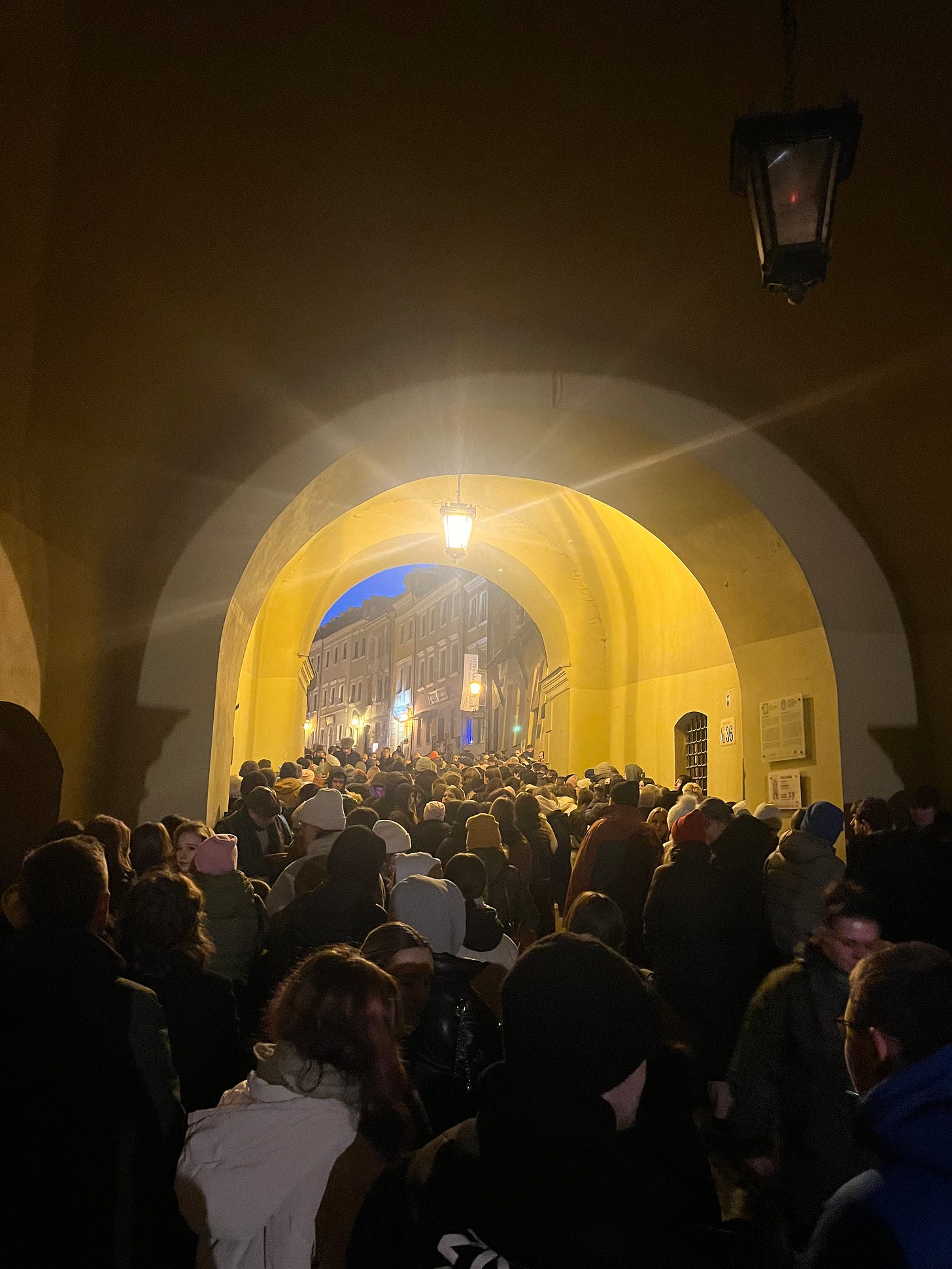This is Not a Love Song
I arrived into the swish and swing of nylon coats. Hundreds of people gathered beneath Lublin’s ghetto gate, a single lamplight shining. Police stationed at every corner. They hooked their thumbs into bullet proof vests and spread wide their legs. Neck stretch and flex in fight-dog stance. All this theater to commemorate Operation Reinhardt.
I was repulsed by the pageantry. So much money poured into this buffoonery. High schoolers bored and scrolling. Adults in demure postures and over-indulgent grief. And what was with the vast numbers of police?
The Poles took turns approaching giant megaphones on a small platform. Slowly, they began to call out the names of dead Jews. How many of them still reside in our stolen homes? Nearby, a reporter adjusted the deadcat on her mic.
In Lublin, many of the Polish restuarants announce their menus with a false Hebrew script; letters gobbled up and spit back in decorative flair. The Poles dress up in our culture and clothes. Jewish weddings without any Jews, wed by fake rabbis under fake chuppas.
I backed into a far-away corner and curled around a lamppost. The Poles continued to call out our names. Let them rattle with their winds, their fires, their earthquakes, I thought.
לא ברוח יהוה
And the Lord was not in the wind.
In the morning, I ran through Saxon Garden—an over-manicured park that holds five white peacocks year-round. I don’t know how, but those birds survive, moored to cold ground with stiff feet. Sunlight filtered through empty branches while peacocks scratched the dirt. Stolen from India in the 18th century, these birds were bred across Europe for the wealthy elite. “Wedding Peacocks,” prized for their rare white plummage.
As I ran up the raked path, security cameras twirled and focused their unblinking eyes upon me. The mechanical sounds sent a tremor through my hands. Panopticon world.
I fix my eye on bird. He smashes his beak into rotten limbs. Appears, then dissapears.
In the workshop, the slow pace of my work pulls me from the thrum of techno-modernity. Robert blasts sardonic rap from East Berlin. This is not a love song. I don’t sing my mother tongue. The studio vibrates with drums and bass as I exchange the leaden spacers, moving type blocks with tweezers.
The room reeks with paint thinner and ink. There is nowhere else in the world I’d rather be.
The next morning, five white peacocks come to peck out my eyes.
We must do this for beauty, they tell me, fanning their bright feathered-eyes.
Why was it always my eyes? Or my mouth? Something with my mother, I’m sure of it. Double-helix of sight and speech. Birds burst my eyes with their beaks.
This is not a love song, the peacocks croon.
You don’t know your mother tongue.
R E A D I N G S
End of Winter by Louise Glück
Meditations in an Emergency by Frank O’Hara
To Go To Lvov by Adam Zagajewski
The Resurrected Brother of Mary and Martha: A Human who Resurrected God! by Jalal Toufic (essay)
Unspeakable Currency (an essay on poetry and money) by poet Edgar Kunz
The Serviceberry: an Economy of Abundance (essay) by Robin Wall Kimmerer
H A P P E N I N G S
All Saints Poetry Hour aired earlier this month, on the lunar eclipse of March 13th! I had the most transcendent time in the radio booth with my co-host, a.Monti. If you missed the live transmission, you can always catch the recording from Refuge Worldwide. Just click the image below to channel devotional sound-art and experimental poetry into your ears.
I will be giving a (virtual) artist’s talk entiteld “Learn to Live with Empty Hands” for the University of Delaware on April 23rd at 11:30 am EST. I’ll be discussing my artistic work and research in both Sabile, Latvia and Lublin, Poland—two sites of Jewish genocide, annihilation, and dispossession. If you’d like to register for the zoom, please let me know and I’ll send you the link! The talk will be 40 minutes, with 10 minutes of Q&A at the end.





